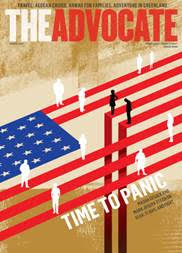 LOS ANGELES — As we begin a new year, the February/ March issue of the The Advocate looks ahead at America in the age of Trump. Following the 2016 Presidential election, Russian-American journalist Masha Gessen turned to legendary LGBT advocate Larry Kramer for guidance on turning despair into action. Gessen came to the United States as a refugee twice from Russia; once 35 years ago to escape Soviet anti-Semitism and again three years ago, with her partner and children to escape Vladimir Putin’s antigay campaign. Most people that come to the United States seeking refuge from homophobia are not as lucky as Gessen and her family.
LOS ANGELES — As we begin a new year, the February/ March issue of the The Advocate looks ahead at America in the age of Trump. Following the 2016 Presidential election, Russian-American journalist Masha Gessen turned to legendary LGBT advocate Larry Kramer for guidance on turning despair into action. Gessen came to the United States as a refugee twice from Russia; once 35 years ago to escape Soviet anti-Semitism and again three years ago, with her partner and children to escape Vladimir Putin’s antigay campaign. Most people that come to the United States seeking refuge from homophobia are not as lucky as Gessen and her family.
Select Quotes from Gessen’s story include:
On the progress made on LGBT issues and whether that progress can be reversed:
“The fairy-tale story of irreversible progress in LGBT rights is a very white American story. Americans of color have long known that progress is not linear. LGBT people from countries like Russia, Hungary, and Turkey, among others, can tell you what it feels like when attitudes make a U-turn. The laws in these countries are benign compared to many places in the world where homosexual behavior is punishable by imprisonment or even death, but that is cold comfort for people who find themselves exposed to prosecution and persecution, without a closet to hide in. As the global culture war in this area heated up over the past few years, as Pride parades in various parts of the world turned into battlegrounds, LGBT people have looked to America for comfort, protection, and small doses of human dignity.”
On the U.S. as a beacon of hope for LGBT people worldwide:
“Queer people have been seeking refuge in the United States for decades, but in the past few years this migration has taken on a new urgency and a new quality, as countries such as Russia, Turkey, El Salvador, and Uganda – to name a few – have launched or intensified attacks on LGBT people while the United States proclaimed that gay rights are human rights. Marriage clinched the deal: even though the United States was roughly the 20th country in the world to legalize same-sex marriage, it was gaining marriage rights in America that seemed to mean that progress was irreversible. Now, with a sworn foe of marriage equality as the vice president-elect, many people are asking if marriage equality can be reversed. The answer is probably not, but it’s the wrong question.
On whether marriage equality can actually be reversed:
“Reversing marriage equality is not impossible, but it would require at least one more vacancy on the Supreme Court, from the pro-marriage-equality side. What is not only possible but likely, though, is that we will begin to think about marriage differently under Trump. Seeking marriage equality was a brilliant legal and civil-right strategy: It worked so fast and applied so broadly that for many people it served as a shortcut to full citizenship. But the right to get married does not equal full citizenship. It is entirely possible to be married and still be systemically discriminated against.”
On the state of the tens of thousands LGBT people currently in various stages of the immigration process:
“Many of them are now in a state of panic. Aaron Morris, executive director of Immigration Equality, told me that the organization is swamped with calls from people who want to rush to file their claims before a crackdown comes, and he added that there is also a second group: those who are so frightened that they want to go into hiding and not let the government know that they exist until it’s over… That’s likely a terrible idea, especially because there is no telling whether or when ‘it’ will be over, but the panic is well-founded.”
Larry Kramer on why it is time to panic, as he did in the initial days of the AIDS crisis:
“Things people said about my panicking didn’t frighten me. They made me angry. I didn’t know I had this anger in me…. So I wrote about it, I spoke whenever I was asked, I was a pariah, people crossed to the other side of the street when I was coming. It’s not that it didn’t bother me, it’s that I found it all fascinating—I guess it’s the writer in me. It took me from ’83–’84, when I got thrown out of GMHC, till ’88 to get people to support this kind of effort. It’s the early days of AIDS all over again. I didn’t think that would ever happen. It makes you want to cry sometimes.”
Read the full Advocate “Time to Panic” story at:











